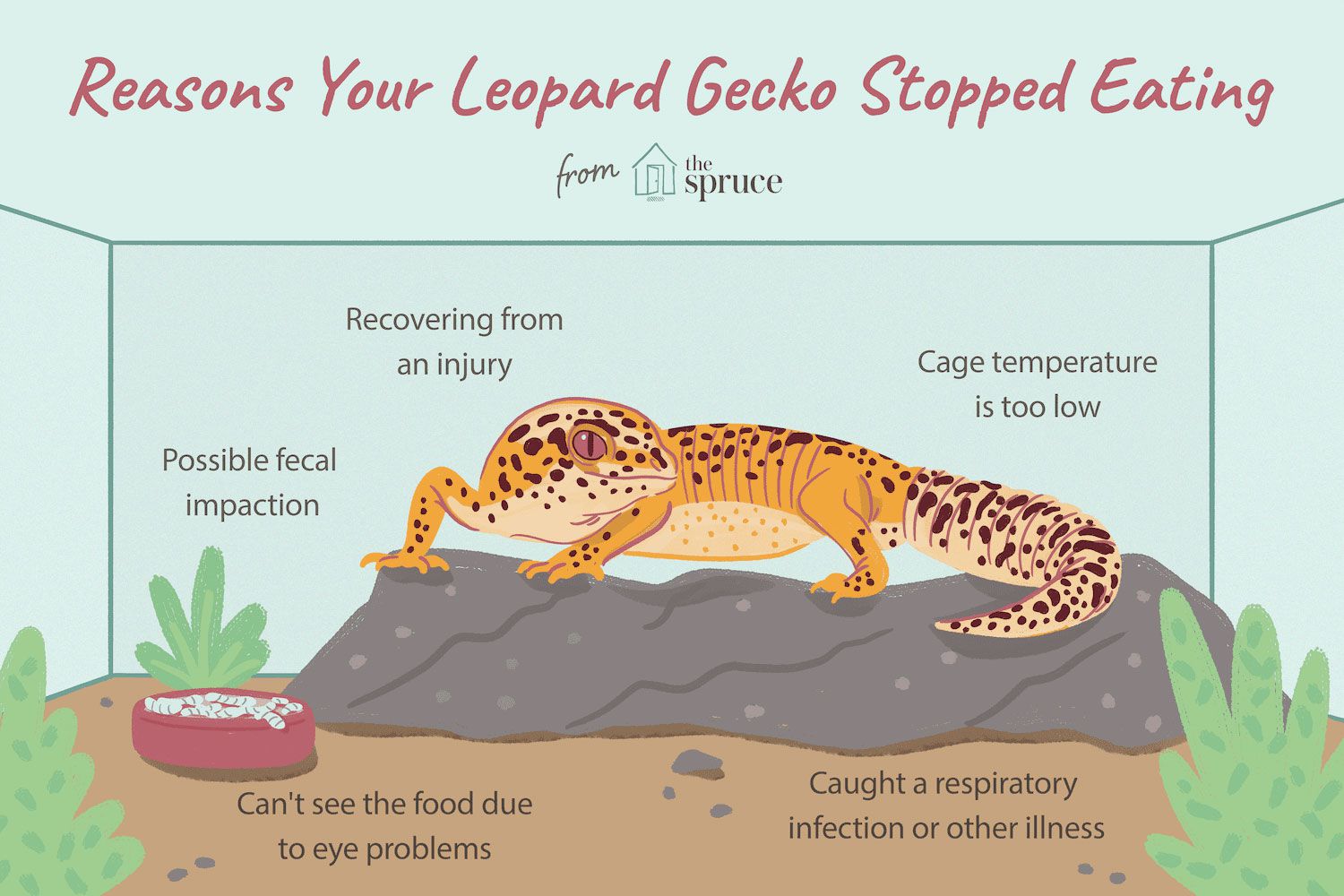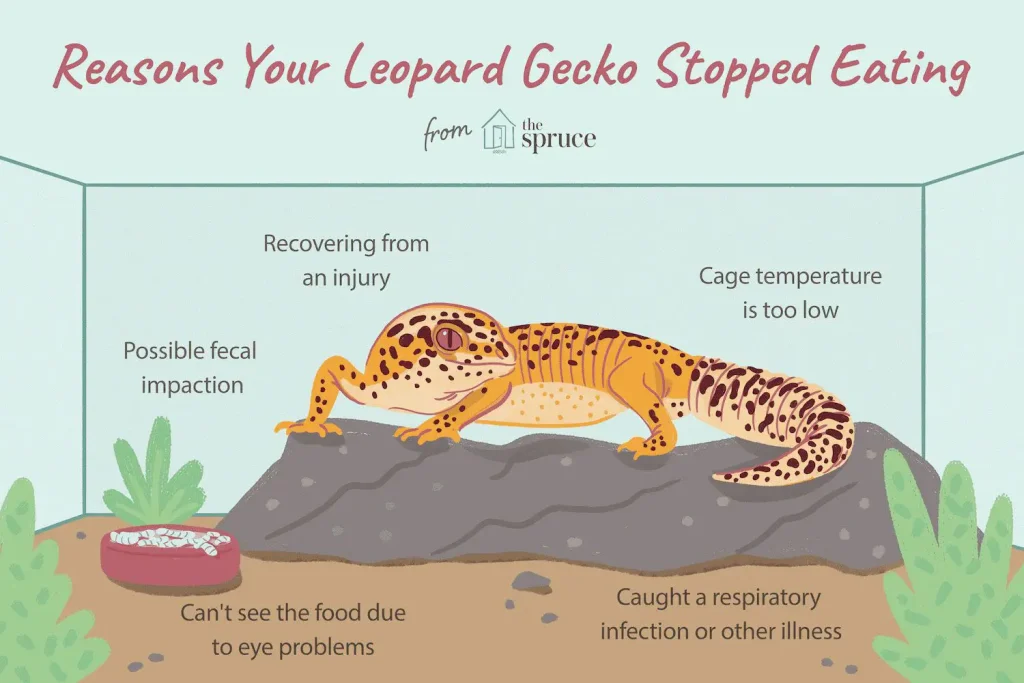Leopard geckos are fascinating creatures that make great pets. However, if you notice that your leopard gecko is not eating, it can be a cause for concern. Leopard geckos are known for their hearty appetites, so a loss of appetite can indicate an underlying issue that needs to be addressed.
There are many reasons why a leopard gecko may not be eating, ranging from stress to illness. In this article, we will explore some of the common causes of leopard gecko appetite loss and provide tips on how to get your gecko eating again. So, if you’re a worried pet owner, read on to learn more about why your leopard gecko may not be eating.
Leopard geckos may stop eating due to stress, illness, improper temperature, or inadequate living conditions. Ensure that the temperature and humidity in their enclosure are appropriate, and provide a suitable diet and a comfortable hiding spot. If your leopard gecko still refuses to eat, consult a veterinarian to rule out any underlying health issues.

Why is My Leopard Gecko Not Eating?
If you are a leopard gecko owner and notice that your pet is not eating, it can be concerning. Leopard geckos are known for their healthy appetite and when they refuse to eat, it could be a sign of an underlying health issue. In this article, we will explore the reasons why your leopard gecko might not be eating and what you can do to help.
1. Incorrect Temperatures
Leopard geckos are ectothermic, which means they rely on external heat sources to regulate their body temperature. If the temperature in their enclosure is too low, it can cause a lack of appetite. It is essential to maintain the correct temperature range between 88°F to 93°F during the day and 73°F to 78°F at night. You can use a thermometer to monitor the temperature and adjust it accordingly.
Additionally, the basking spot temperature should be around 95°F to 100°F. If the basking spot is too hot or too cold, your leopard gecko may not feel comfortable enough to eat.
2. Wrong Lighting
Leopard geckos are crepuscular, which means they are most active during dawn and dusk. They need a day and night cycle to maintain their circadian rhythm. If they are exposed to constant light or darkness, it can affect their appetite.
Ensure that your leopard gecko has access to 12 hours of light and 12 hours of darkness every day. You can use a timer to regulate the lighting in their enclosure.
3. Stress
Leopard geckos are sensitive creatures and can become stressed easily. Stress can be caused by many factors, including wrong temperatures, incorrect lighting, overcrowding, or handling. When your leopard gecko is stressed, they may refuse to eat.
Try to identify the source of stress and eliminate it. Ensure that their enclosure is spacious enough, provide hiding spots, and avoid excessive handling.
4. Illness
If your leopard gecko is not eating and is displaying other symptoms like lethargy, weight loss, or diarrhea, it could be a sign of an underlying health issue.
Common illnesses in leopard geckos include metabolic bone disease, constipation, respiratory infections, and parasitic infections. If you suspect that your leopard gecko is sick, seek veterinary attention immediately.
5. Seasonal Changes
Leopard geckos are affected by seasonal changes, and their appetite may decrease during the winter months when they naturally brumate. Brumation is a period of inactivity when leopard geckos slow down their metabolism to conserve energy.
During this time, reduce the temperatures in their enclosure and reduce the lighting to simulate winter conditions.
6. Feeding Schedule
Leopard geckos should be fed insects like crickets, mealworms, or dubia roaches. They are also known to enjoy waxworms as an occasional treat. It is essential to feed them appropriately sized insects, depending on their age and size.
If you are feeding your leopard gecko too often, they may lose their appetite. Alternatively, if you are not feeding them enough, they may become too hungry, leading to overeating.
7. Food Preferences
Leopard geckos can be picky eaters and may have food preferences. If you only offer them one type of insect, they may become bored and refuse to eat.
Try to offer them a variety of insects and see which ones they prefer. You can also try offering them different types of fruits and vegetables as a treat.
8. Impaction
Impaction is a severe health issue that can occur if your leopard gecko ingests substrate or other foreign objects. Impaction can lead to blockages in their digestive system, causing a lack of appetite and other symptoms.
Ensure that you are using the correct substrate, and remove any foreign objects from their enclosure. If you suspect impaction, seek veterinary attention immediately.
9. Shedding
Leopard geckos shed their skin every few weeks, and during this time, they may lose their appetite. Shedding can be uncomfortable for your leopard gecko, and they may not feel like eating.
Ensure that the humidity levels in their enclosure are between 30% to 40% to help with shedding. You can also provide a humid hide to help them shed more comfortably.
10. Age
As leopard geckos age, their metabolism slows down, and they may not need to eat as much. If your leopard gecko is older, it is normal for them to eat less frequently.
Ensure that you are offering them appropriately sized insects and not overfeeding them.
In conclusion, there can be many reasons why your leopard gecko may not be eating. It is essential to identify the underlying cause and take appropriate action to help them. Ensure that their enclosure is maintained correctly, and if you suspect that they are sick, seek veterinary attention immediately. Remember, a healthy leopard gecko is a happy leopard gecko.
Frequently Asked Questions
Leopard geckos are popular pets, known for their unique appearance and easy-to-care-for nature. But sometimes they can be picky eaters, which can be a cause for concern. Here are 5 common questions and answers about why your leopard gecko may not be eating.
Why is my leopard gecko not eating?
There are several reasons why a leopard gecko may stop eating. One common reason is stress. Stress can be caused by a change in environment, such as a move to a new cage or a new home. Illness can also cause stress and a lack of appetite. Another reason may be that the temperature in the cage is too low, making it difficult for the gecko to digest its food.
If your gecko has not eaten for more than a week, it is important to take them to a veterinarian. The veterinarian can perform tests to determine if there is an underlying medical issue causing the gecko to not eat.
What should I do if my leopard gecko is not eating?
If your leopard gecko is not eating, there are a few things you can do to encourage them to eat. First, make sure the temperature in the cage is appropriate. The temperature should be around 90 degrees Fahrenheit on the warm side of the cage and 75 degrees Fahrenheit on the cool side.
Offer a variety of food options, such as crickets, mealworms, and waxworms. You can also try offering a different type of food, such as a different size or flavor of cricket. Make sure the food is appropriately sized for your gecko and that it is being offered at the right time of day, as leopard geckos are nocturnal and typically only eat at night.
Can stress cause a leopard gecko to stop eating?
Yes, stress can cause a leopard gecko to stop eating. Stress can be caused by a variety of factors, such as a change in environment, an illness, or even a lack of hiding places in the cage. If you suspect your gecko is stressed, try to identify the cause and address it. Providing hiding places, reducing noise and activity around the cage, and maintaining a consistent environment can all help reduce stress in your gecko.
If your gecko has not eaten for more than a week, it is important to take them to a veterinarian. The veterinarian can perform tests to determine if there is an underlying medical issue causing the gecko to not eat.
What are some signs that my leopard gecko is not eating?
There are several signs that your leopard gecko may not be eating. One of the most obvious signs is a lack of interest in food. You may notice that your gecko is not actively seeking out food, or that they are not eating the food you offer. Another sign is weight loss. If your gecko is not eating, they will start to lose weight.
You may also notice that your gecko is less active than usual, or that they are not drinking as much water. If you notice any of these signs, it is important to take your gecko to a veterinarian to determine the cause of the problem.
What can I do to prevent my leopard gecko from becoming stressed?
There are several things you can do to prevent your leopard gecko from becoming stressed. First, make sure the cage is set up in a quiet area where there is not a lot of activity or noise. Provide plenty of hiding places, as leopard geckos like to hide during the day.
Make sure the temperature and humidity in the cage are appropriate. Keep the cage clean and provide fresh water daily. Try to maintain a consistent routine in terms of feeding and handling your gecko. By taking these steps, you can help ensure that your leopard gecko stays healthy and stress-free.
5 Reasons Your Leopard Gecko Isn’t Eating – Picky Geckos
In conclusion, there can be several reasons why your leopard gecko may not be eating. It’s important to first assess their living conditions, including temperature, humidity, and lighting. Another factor to consider is your gecko’s overall health and stress levels.
If you’ve ruled out any environmental issues and your gecko is still not eating, it may be time to seek veterinary care. A qualified reptile veterinarian can help diagnose any underlying health issues and provide treatment.
Remember, every gecko is unique and may have different needs and preferences when it comes to their diet. Be patient and continue to offer a variety of food options until you find what works best for your leopard gecko.
Overall, taking the time to properly care for your leopard gecko and addressing any eating concerns can lead to a happy and healthy pet.


